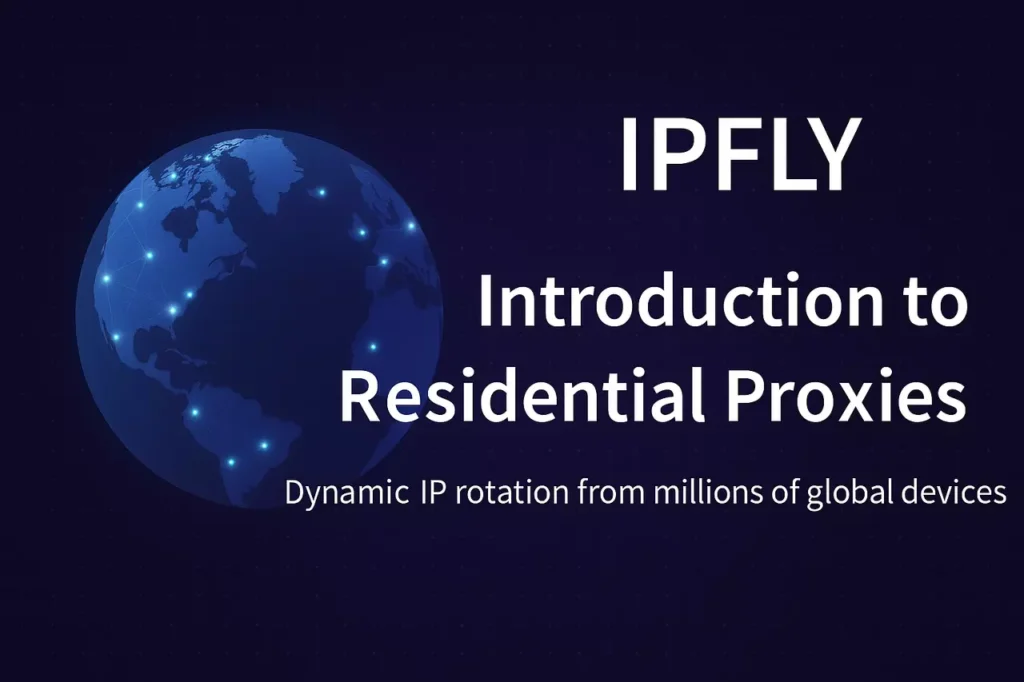In the world of digital infrastructure, privacy and unrestricted access are non-negotiable for modern businesses. One term you’ll often encounter in this space is random IP — a key component in everything from market research to ad verification and fraud prevention.
But what exactly is a random IP, why does it matter, and how can businesses use it safely and effectively? More importantly, how does a trusted provider like IPFLY enable enterprises to access random, secure, and clean IP addresses through residential and datacenter proxy solutions?
Let’s break it down.

What Is a Random IP?
A random IP address refers to an internet protocol (IP) address that changes frequently or rotates at intervals, without being assigned to a fixed device or user. Random IPs are typically sourced through proxy servers or VPN services that assign a new IP address every time you connect or after a certain number of requests.
Unlike static IPs, which maintain a consistent digital identity, random IPs improve anonymity by regularly shifting your online address, making it difficult for websites, services, or tracking systems to link your activity to a single source.
Why Do Businesses Need Random IPs?
For enterprises operating in competitive, data-driven markets, having access to random IP addresses is crucial for several reasons:
🌍 1. Bypass Geo-Restrictions
Many services and platforms limit access based on user location. By using random IPs from different regions, businesses can access geo-locked content, price listings, or regional ad campaigns.
Example: An e-commerce brand testing product listings in the UK, US, and India can rotate random IPs to see how pricing and availability vary.
📊 2. Conduct Market Research Undetected
When scraping or gathering market data, sending multiple requests from a single IP risks triggering security systems. Random IP rotation ensures each request appears to originate from a different source, reducing block risks.
🛡️ 3. Prevent IP Bans and Blocks
Platforms often block IPs showing suspiciously high traffic or repetitive actions. Using random IPs spreads traffic load across multiple addresses, keeping enterprise automation tools running smoothly.
How to Get Random IP Addresses
To reliably and safely use random IPs, businesses typically rely on proxy services — and that’s where IPFLY comes in.
Why IPFLY Is a Trusted Solution for Random IP Rotation

IPFLY is a global proxy service provider offering 90M+ residential and static residential IP addresses in over 190 countries. Its infrastructure is designed for secure, high-performance data access — and includes support for random IP assignment through both dynamic residential proxies and rotating proxy pools.
✅ Residential Proxies for Organic Traffic
IPFLY’s dynamic residential proxies assign a fresh residential IP from a legitimate ISP pool every time you connect or at custom rotation intervals. These proxies mimic genuine user traffic, making them ideal for web scraping, ad verification, and bypassing geo-restrictions without detection.
✅ Static Residential Options
For businesses needing long, stable sessions — like account management or payment gateway testing — IPFLY’s static residential proxies offer persistent IPs that can also be scheduled to rotate for added security when needed.
✅ Datacenter Proxies for Speed & Scale
In scenarios requiring large volumes of requests (like bulk market data scraping), IPFLY’s dedicated datacenter proxies can rotate across clean, enterprise-grade IP pools to maintain high request success rates while protecting your infrastructure from bans.
How Random IP Rotation Works
With IPFLY, businesses can configure random IP rotation in several ways:
- Per Request: Assign a new IP address after each HTTP or HTTPS request.
- Per Session: Keep the same IP for the duration of a session, then switch.
- Timed Intervals: Change IP addresses after a predefined time period.
- Custom Rules: Rotate IPs based on success/failure rates or target platform detection risks.
This flexibility allows enterprises to balance security, speed, and operational stability based on task sensitivity.
Best Use Cases for Random IPs
🛒 E-Commerce Price Monitoring
Track regional pricing without detection by rotating random IPs from relevant regions.
📱 Social Media Management
Manage multiple social media accounts for clients, each using a distinct IP, reducing the risk of bans or shadowbans.
📝 SEO & Ad Verification
Verify ad placement accuracy in multiple markets while bypassing content filters with city-level targeting.
💳 Payment Gateway Testing
Test payment processing systems from different geographic locations without compromising testing integrity.
How to Safely Use Random IPs
Using random IPs responsibly ensures business continuity and protects your infrastructure. Here are some best practices:
🔄 Optimize Rotation Settings
Avoid overly aggressive rotation (e.g. changing IPs every second) as this can still trigger platform defenses. IPFLY’s system allows fine-tuning of rotation frequency for each use case.
🛡️ Stick with Trusted Providers
Never rely on free or suspiciously cheap proxy services. Many of these use blacklisted, overused, or compromised IPs, risking security breaches and platform bans. IPFLY only uses clean, high-trust residential IPs sourced from legitimate ISPs.
📊 Monitor Traffic Patterns
Track IP block rates, latency, and session drops to adjust your proxy strategy in real time. IPFLY offers usage analytics and real-time monitoring via its control panel.
Future of Random IP Services
As detection technologies become more sophisticated — with AI-powered fraud prevention and fingerprint tracking — the role of clean, rotating, residential-grade random IPs is growing.
IPFLY is actively expanding its residential IP network and investing in AI-based proxy management tools to stay ahead of detection systems and offer next-gen random IP solutions for enterprise clients.
Conclusion: Make Random IP Management Simple with IPFLY
Whether you’re bypassing geo-restrictions, monitoring competitor prices, or testing ads globally, random IP addresses are a vital tool in the modern digital business toolkit.

With IPFLY’s residential and datacenter proxy solutions, businesses can access reliable, ethically sourced random IPs with flexible rotation schedules, enterprise-grade uptime, and proactive technical support.
Looking to power your next data operation or digital campaign with clean, high-performance random IP addresses?Contact IPFLY today to get started with a custom proxy plan tailored to your needs.


